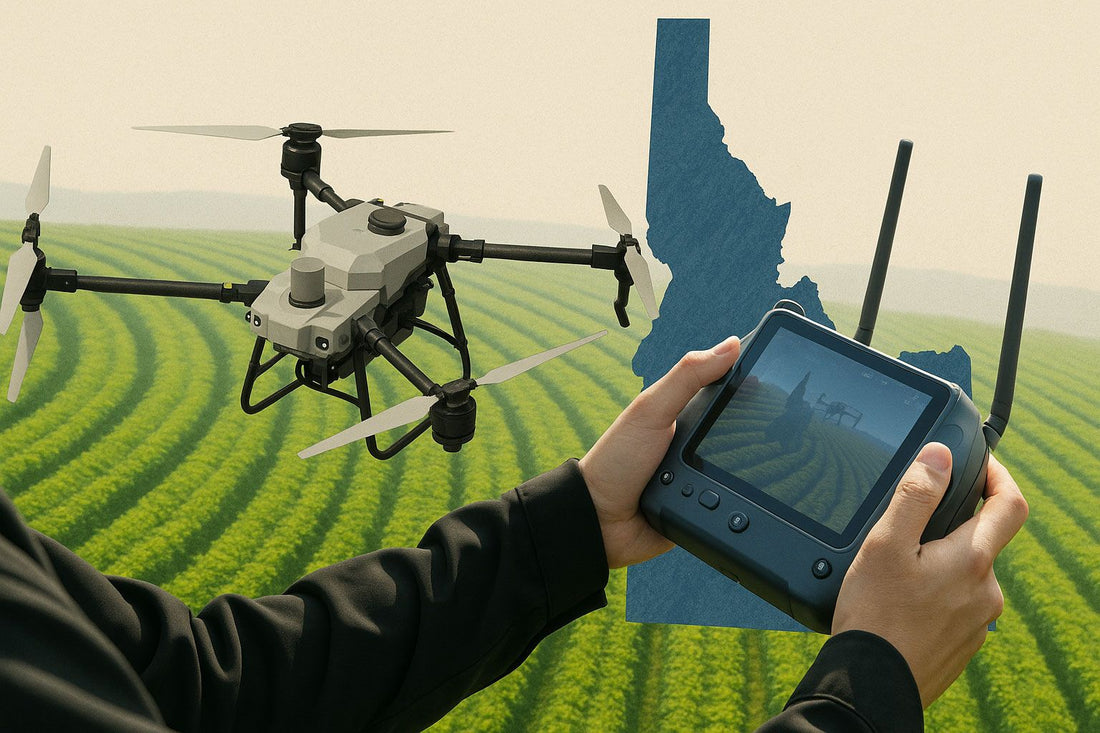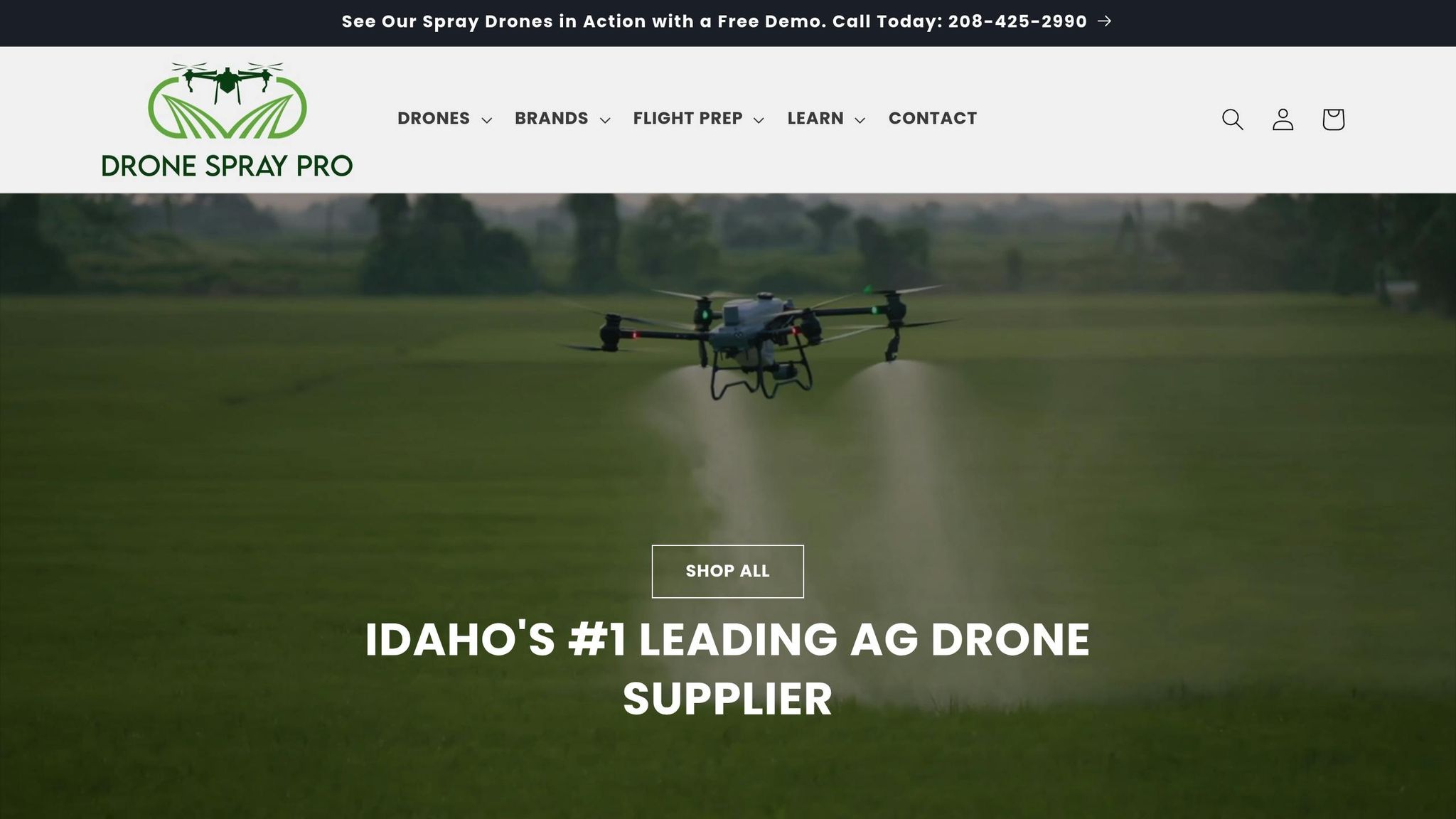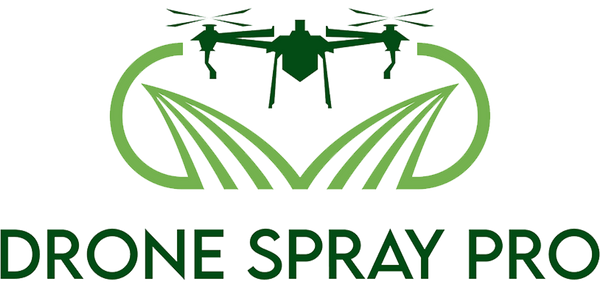
How to Get Your Agricultural Drone Pilot License In Idaho: Step-by-Step Guide
Share
To legally operate agricultural drones in Idaho, you’ll need both federal and state certifications. Here’s a quick breakdown of what’s required:
-
Federal Requirements:
- FAA Part 107 Remote Pilot Certificate: Pass a $175 knowledge test to fly drones commercially.
- FAA Drone Registration: Each drone must be registered for $5.
- FAA Part 137 Certificate: Required for aerial applicators.
- Section 44807 Exemption: Necessary for drones over 55 pounds.
- Medical Certificate: Needed for drones over 55 pounds.
-
Idaho State Requirements:
- Pesticide Applicator License: Obtain this through the Idaho State Department of Agriculture.
- Follow Idaho-specific drone laws, including privacy and no-fly zone restrictions.
Steps to Get Licensed:
- Get your FAA Part 107 Certificate.
- Register your drone on the FAA DroneZone website.
- Apply for an FAA Part 137 Certificate.
- Secure a Section 44807 exemption (if applicable).
- Obtain a medical certificate (if applicable).
- Get your Idaho Pesticide Applicator License.
- Maintain detailed records of spray operations.
This guide ensures you meet all legal requirements for agricultural drone operations in Idaho. Stay compliant by renewing your licenses and reviewing regulations regularly.
Drone Spraying Operations and the Law (Part 137 Operations)
Legal Requirements for Farm Drone Pilots
If you're an agricultural drone pilot in Idaho, it's crucial to follow both federal and state regulations to operate legally and safely.
Federal Drone Laws and Certifications
The Federal Aviation Administration (FAA) has specific requirements for agricultural drone pilots, including certifications and registrations:
Part 107 Remote Pilot Certificate: To fly drones commercially, you must have a Remote Pilot Certificate under FAA Part 107. The test costs $175 and ensures you understand drone laws and safety protocols. Here's how to get certified:
- Set up an IACRA profile to obtain your FAA Tracking Number.
- Pass the Part 107 knowledge exam.
- Register each drone for $5 (valid for three years).
Other Federal Requirements:
- FAA Part 137 Agricultural Aircraft Operator Certificate.
- Section 44807 authorization for drones weighing over 55 pounds.
- FAA Second-Class Medical Certificate for drones over 55 pounds.
Once you're federally certified, it's time to review Idaho's specific drone regulations.
Idaho State Drone Rules
Idaho has additional rules that focus on privacy, property rights, and local airspace restrictions. Here are the key guidelines:
- Idaho Statute 21-213: Using drones to collect data or conduct surveillance on private property without permission is prohibited. Flying near critical infrastructure also requires authorization.
- Ada County: All drones must be FAA-registered, regardless of weight. Capturing images or audio of people or private property without consent is banned, as is recording audio in areas where privacy is expected.
- Canyon County: Drone launches, landings, and flights are not allowed in county parks or natural resource areas. Flying below 500 feet AGL requires approval from the director.
- Wildlife Management Areas (WMAs) and State Parks: Operations in these areas are restricted unless you have prior authorization.
- Use tools like B4UFLY or AirMap to check for no-fly zones and airspace restrictions.
Staying compliant with both federal and Idaho-specific rules helps ensure your drone operations are legal while respecting public safety and privacy. Regularly check for updates, as drone regulations can change.
7 Steps to Get Your Farm Drone License
To operate drones on your farm legally, follow these seven steps to secure the necessary license:
1. Get Your FAA Part 107 Remote Pilot Certificate
Start by completing the FAA Part 107 Remote Pilot Certificate. For more details, refer to the 'Federal Drone Laws and Certifications' section.
2. Register Your Drone
Head to FAADroneZone to register your drone. Make sure to display its N-number as required.
3. Apply for FAA Part 137 Operator Certificate
To apply for the FAA Part 137 Operator Certificate, you’ll need:
- A valid Part 107 certificate
- A registered drone
Submit FAA Form 8710-3, along with your Standard Operating Procedures (SOPs) and exemption numbers, to UAS137Certificates@faa.gov. The review process usually takes 2–4 months.
4. Secure Section 44807 Exemption
If your drone weighs more than 55 pounds, you’ll need to obtain a Section 44807 exemption.
5. Obtain a Medical Certificate
For drones over 55 pounds, you are required to get a third-class medical certificate from an FAA-authorized medical examiner.
6. Idaho Pesticide Applicator License
Visit the Idaho State Department of Agriculture website to get your Idaho Pesticide Applicator License.
7. Maintain Recordkeeping
Keep detailed records of every spray operation. Include the date, location, and substances used for each application.
sbb-itb-3b7eef7
Training Resources and Study Materials
Now that you understand the steps to secure your licenses, here are some study materials and training tools to help you pass exams and sharpen your flying skills.
FAA Exam Prep and Simulator
Check out the Zephyr Drone Simulator. It offers realistic flight physics, accurate models, and all-weather training. Plus, it includes modules covering Part 107 exam topics and APSA-NIST proficiency evaluation prep. Access starts at just $9.99.
Drone Spray Pro Training Assistance

Drone Spray Pro can answer questions you have about drone certifications and can provide you with basic info about getting started. Complete spray-drone packages are available to get agricultural drone operations in Idaho off the ground fast.
Keeping Your License Current
Once you've obtained your FAA and Idaho state licenses, it's important to keep them valid by following the renewal requirements for both federal and state regulations.
License Renewal Requirements
- Complete the FAA's free online recurrent training every 24 months to maintain your Part 107 certification privileges.
- After completing the training, the FAA will issue a test report with your updated expiration date. Be sure to carry this report along with your certificate. If your privileges expire, you’ll need to complete the ALC-677 course before resuming drone operations.
Idaho Pesticide Applicator Recertification
To keep your Idaho pesticide applicator license valid, attend annual recertification seminars and submit your earned credits through Idaho's online system before your license's expiration date.
Next Steps for New Drone Pilots
Once you've secured your federal and state credentials, it's time to focus on preparing for safe and effective operations. Follow these key practices to stay compliant and ensure smooth drone missions:
- Use pre-flight and post-flight checklists to meet FAA Part 107 safety rules.
- Always maintain a visual line-of-sight (VLOS) during flights.
- Get drone liability insurance for added protection.
- Review restrictions for WMAs and state parks every year.
FAQs
What happens if I operate an agricultural drone in Idaho without the required licenses?
Operating an agricultural drone in Idaho without the proper licenses can lead to serious consequences. You may face hefty fines, legal penalties, or even restrictions on future drone operations. Additionally, flying without the required certifications violates FAA regulations and Idaho state laws, which could result in having your drone confiscated or your business operations suspended.
To avoid these risks, ensure you meet all licensing requirements, including obtaining your FAA Remote Pilot Certificate and complying with Idaho-specific regulations for agricultural drone use.
How often do I need to renew my FAA Part 107 and Idaho Pesticide Applicator licenses, and what’s the renewal process?
The FAA Part 107 Remote Pilot Certificate must be renewed every 24 calendar months. To renew, you’ll need to complete a free online recurrent training course provided by the FAA. This ensures you stay updated on regulations and safety procedures for drone operations.
For the Idaho Pesticide Applicator license, renewal requirements vary depending on the type of license you hold. Typically, you’ll need to renew annually or biennially and may be required to complete continuing education credits. Check with the Idaho State Department of Agriculture for specific details on renewal timelines and requirements.
What are the best training resources for passing the FAA Part 107 and Part 137 exams?
To prepare for the FAA Part 107 exam, consider enrolling in a comprehensive online training course. These courses often include detailed video lessons, practice quizzes, and test simulations to help you succeed. For example, some programs boast high success rates for first-time test takers and provide lifetime access to study materials. Similarly, for the FAA Part 137 certification, look for specialized training focused on agricultural drone operations, including safety protocols and compliance requirements.
Both certifications require thorough preparation, so choosing a reputable course with expert guidance and up-to-date materials is essential for passing the exams and becoming a licensed agricultural drone pilot.
